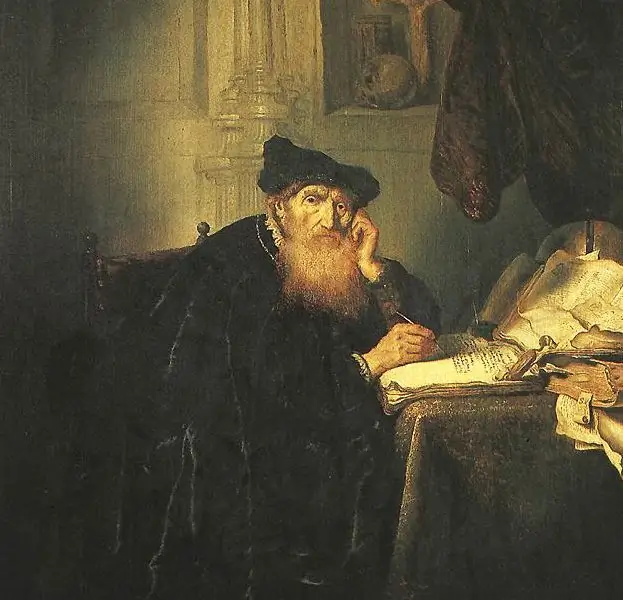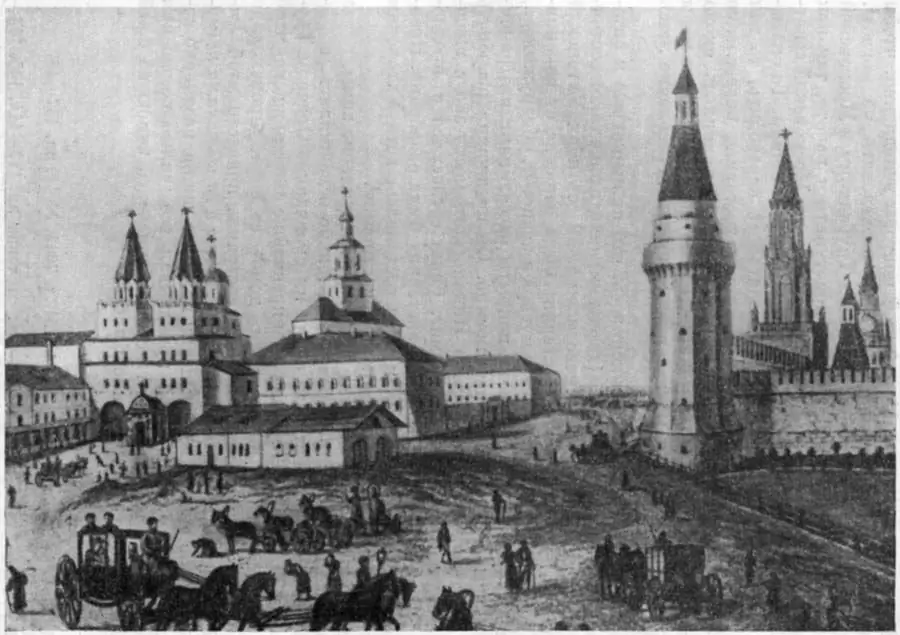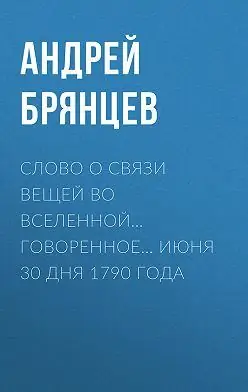- Author Antonio Harrison [email protected].
- Public 2023-12-16 07:44.
- Last modified 2025-01-22 21:44.
Andrei Bryantsev is a Russian philosopher, objective idealist, state councilor of the 18th century. One of the first to introduce the Russian public to the philosophy of Kant. He referred to the general laws of nature as Leibniz's law of continuity, the law of "thrift", as well as the law of conservation of the amount of matter and forces in nature.

Childhood and adolescence of Andrei Bryantsev
Andrei Mikhailovich Bryantsev was born on January 1, 1749 in the family of a clergyman in the Odigitrievskaya Hermitage near Vologda. Now, at this place of the monastery in the Vologda region, the remains of pre-revolutionary bricks are found inside an earthen rampart.

Andrei Bryantsev was orphaned early. He was brought up at the Vologda Theological Seminary. Love for teaching and the desire for further improvement prompted him to leave his homeland, and without graduating from the Vologda Theological Seminary, having a few kopecks in his pocket, he went on foot to Moscow and entered the Slavic-Greek-Latin Academy on the course of theology and philosophical sciences. He also did not graduate from it, refusing to take a monk's hair.
In 1770, abandoning a spiritual career, Bryantsev became a student at Moscow University, a disciple, and later an associate of Professor D. S. Anichkov and S. E. Desnitsky. In addition to the philosophical course, he studied exact sciences, jurisprudence and foreign languages.

Philosopher career
In 1787, after completing his university course, Andrei Bryantsev became a master of philosophy at Moscow University. Continuing education. defended his thesis for the degree of master of philosophy "On the criterion of truth", he was awarded the degree of master of philosophy and liberal sciences.
In 1779, Bryantsev was appointed teacher of Latin and Greek at the university gymnasium.
In 1789, after the death of D. S. Anichkov, he was promoted to extraordinary professor.
From 1791 to 1795 he served as a university censor. In 1795 he became an ordinary professor of logic and metaphysics at Moscow University. He remained in this position until the end of his life. His master's thesis "De criterio veritatis" (1787) remained unpublished.
From 1804 to 1806 he was the director of the Pedagogical Institute. In addition, Andrei Bryantsev performed a number of other duties - dean of the ethical and political department of the university, director of the Moscow Pedagogical Institute, censor at the university printing house, member of the school committee, dean of the ethical and political department, etc.
In 1817-1821. an adjunct under Bryantsev was Davydov, who was mainly engaged in teaching philosophical disciplines. Andrey Bryantsev did not create his own original system. At the beginning of his career, he mainly adhered to the system of H. Wolf, which he then supplemented with some elements of Kantianism, and he did not rely on the works of I. Kant, but on the works of one of his followers, FWD Snell.
Creativity of philosophy Bryantsev
According to Andrey Bryantsev, nature, on the one hand, is a physical whole, a mechanically structured body, subject to the law of causality. On the other hand, it is a "moral whole", in the three kingdoms of which the expediency established by God dominates. All things are not only "linked" in time and space by a "physical connection", where the present is determined by the past and contains the cause of the future, but are also linked by means of goals ("ultimate causes") prescribed by the creator.
Bryantsev Andrey attributed to the general laws of nature Leibniz's law of continuity, the law of "thrift", as well as the law of conservation of the amount of matter and forces in nature, which he formulated based on the ideas of Descartes, Bilfinger, Mendelssohn.
Bryantsev was one of the first to introduce the Russian public to Kant's philosophical views.
Bryantsev did not create his own original philosophical system and was influenced by German thought: at first he adhered to the system of Chr. Wolf, then moved to the position of Kantianism. Here the main source for him was the works of the Kantian
Andrei Mikhailovich Bryantsev interpreted the laws of nature in the spirit of causal-teleological parallelism. According to Bryantsev, the universe is based on a kind of "incomprehensible activity" that animates all its parts.
In general, Bryantsev's philosophy can be characterized as deism with a tinge of mechanism. "The universe in the thing itself is an immeasurable body, mechanically arranged, and is made up of innumerable parts of various sizes and hardness, which are mutually conjugated by means of a universal law." The philosopher adhered to the theory of many worlds and an infinite variety of forms of organic life, i.e. views were unacceptable for the church consciousness of that time. Bryantsev's freethinking was limited to the framework of academic constructions and did not affect his university career.
Works of the philosopher
- Bryantsev Andrey Mikhailovich left the following compositions and translations:
- Composition "A Word on the Connection of Things in the Universe" 1790. The work has a pronounced deistic character with a touch of mechanism. This is how, in particular, Bryantsev defines the Universe: "… the universe in the thing itself is an immeasurable body, mechanically arranged, and made up of innumerable parts of various sizes and hardness, which are mutually conjugated by means of a universal law." Here, Bryantsev defends the theory of many worlds and an infinite variety of forms of organic life.

Composition "The Word about the General and Main Laws of Nature" 1799. In this essay, relying on the Wolffian tradition, Andrey Bryantsev discusses the basic laws, among which he includes the law of continuity, the law of thrift, the shortest path, or the smallest means, and the law of universal conservation

- He made a great contribution to the translations: "The Initial Foundations of Moral Philosophy" by GA Fergusson in 1804 and (together with SE Desnitsky) "The Interpretation of English Laws" by W. Blackston, 1780-1782; courses of the philosophers Schnell, Reis, the work of Ferposson "The Initial Foundations of Moral Philosophy" 1804.
- Remaining in manuscript and unpublished article "Compendium antiquitatum Graecarum" 1798.
- "Scheler's abbreviated Latin language teaching or grammar" 1787.
Many of his writings perished in a fire in Moscow in 1812.






